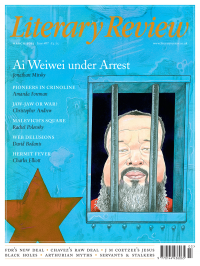John Gray
Evasion Tactics
Fractured Times: Culture and Society in the 20th Century
By Eric Hobsbawm
Little, Brown 336pp £25
Speaking with the Italian journalist Antonio Polito in an extended interview published as The New Century (2000), Eric Hobsbawm explained why he confined his work as a historian primarily to the 19th century. Writing 20th-century history would have required him to deal with the Soviet Union, which he was not inclined to do:
It is clear that scholars who were critical of communism have less hesitation in studying phenomena like the gulags, while a communist historian would certainly prefer to avoid it … I have tended to avoid dealing with it directly, because I knew that if I had, I would have had to have written things that would have been difficult for a communist to say without affecting my political activity and the feelings of my comrades. This is why I chose to become a nineteenth-century historian rather than a twentieth-century one.
In terms of the study of history Hobsbawm’s decision was highly productive. Forming his celebrated trilogy on the ‘long nineteenth century’ from the French Revolution up to the outbreak of the Great War, The Age of Revolution (1962), The Age of Capital (1975) and The Age of Empire (1987) are

Sign Up to our newsletter
Receive free articles, highlights from the archive, news, details of prizes, and much more.@Lit_Review
Follow Literary Review on Twitter
Twitter Feed
Russia’s recent efforts to destabilise the Baltic states have increased enthusiasm for the EU in these places. With Euroscepticism growing in countries like France and Germany, @owenmatth wonders whether Europe’s salvation will come from its periphery.
Owen Matthews - Sea of Troubles
Owen Matthews: Sea of Troubles - Baltic: The Future of Europe by Oliver Moody
literaryreview.co.uk
Many laptop workers will find Vincenzo Latronico’s PERFECTION sends shivers of uncomfortable recognition down their spine. I wrote about why for @Lit_Review
https://literaryreview.co.uk/hashtag-living
An insightful review by @DanielB89913888 of In Covid’s Wake (Macedo & Lee, @PrincetonUPress).
Paraphrasing: left-leaning authors critique the Covid response using right-wing arguments. A fascinating read.
via @Lit_Review